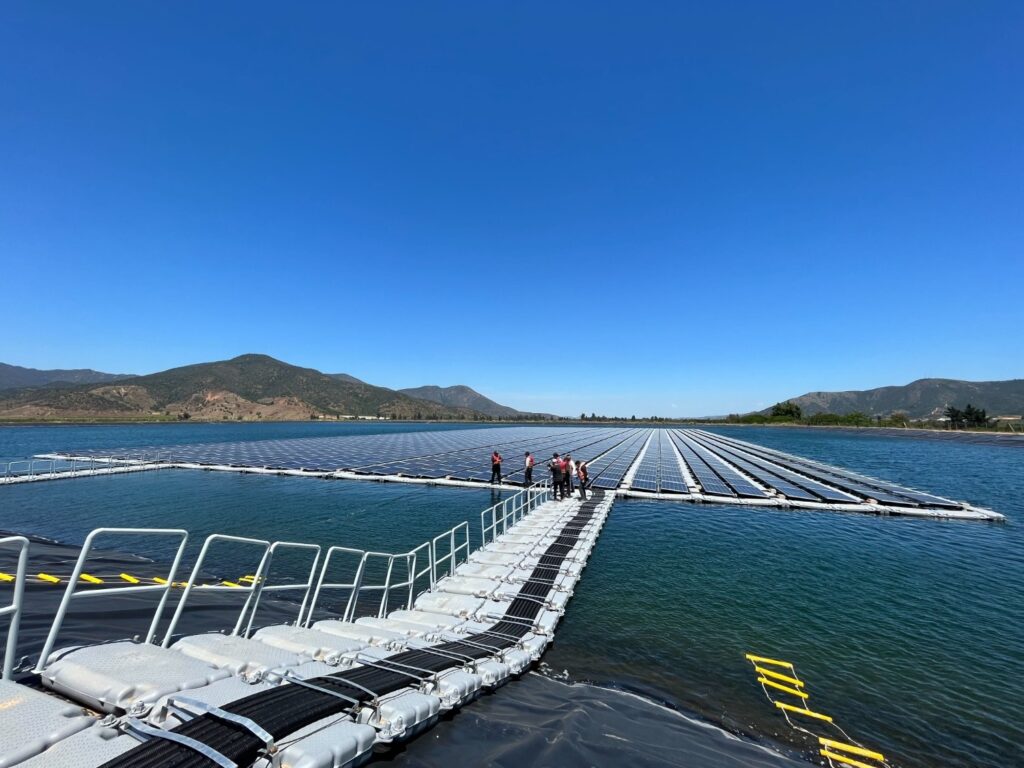Largest floating solar plant in the southern cone inaugurated in Chile

Last week, FreshFruitPortal.com was invited to the inauguration of the
largest floating solar plant in South America, located in Chile’s O'Higgins Region. The project was done for the fruit exporter, Verfrut, and is operated by Solarity providing clean energy to Fundo Quilamuta.
The solar plant has an installed capacity of 1,090 kWp and an extension of 2.5 acres and will float on Verfrut’s small lake, in line with the company's efforts to promote sustainability in the production, packaging, export, and marketing of fresh fruit.
The project consists of a total of 1,998 solar panels placed over 2,493 floats, covering two acres. Using 8 inverters, energy is collected to convert it into alternating current that is injected directly for the consumption of the Quilamuta farm.
Verfrut's General Manager, Javier Martínez said, "Verfrut is aligned with the Sustainable Development Goals (SDGs) promoted by the United Nations, especially those that refer to the development of affordable and non-polluting energy, responsible production and consumption, and the implementation of actions for the climate."
Sustainable spirit
The Quilamuta estate is the largest of the Verfrut group in Chile, with 6,760 acres, of which 1,685 acres are productive, while another 4,500 acres are for nature conservation. In addition to the use of clean energy, composting is also carried out and two areas are for waste collection and recycling.
Andrés Marambio, manager of the Quilamuta Estate, comments that it was chosen for the project because it has the greatest diversity of plantations that coexist with the native ecosystem of the area.
"We have been pioneers in sustainable development, our production reaches the five continents and since our inception, our goal has been to be leaders in sustainable development and positively impact on environmental care," he says.
María Teresa Figueroa, Verfrut's marketing manager, says that Fundo Quilamuta grows table grapes, plums, nectarines, cherries, avocados, clementines, kiwifruit, pears and Asian pears. She adds, "We are reaffirming our commitment to sustainability, it has been our focus, we know that we contribute more than fruit, but quality of life. In this area we have followed a constant search for more sustainable processes and the project is a response to our line."
Collaboration between agriculture and energy
The Chilean Minister of Energy, Diego Pardow, said during the ceremony that this type of technology makes it possible to avoid evaporation by up to 10% since the lake loses less water and at the same time the temperature of the water makes the solar panel heat less, and thus more efficient, since the solar panels lose efficiency as they heat up."
Pardow added that complementing agriculture and energy is beneficial for both.
"The future lies in complementarity, the ability to coexist between traditional agriculture and new, renewable energies."
In this regard, the Chilean Minister of Agriculture, Esteban Valenzuela, said that the project has three virtues: "It takes up less space, reduces water evaporation, and is part of a circular economy. So we need small, medium, and large-scale agriculture to be able to solve problems within the farm.”
Solar Power Plant
Solarity's General Manager, Horacio Melo, indicates the plant delivers approximately 40% of the farm's demand, with more efficient and economical energy that is generated on-site.
"The 1,090 kWp of installed capacity of the Quilamuta plant allows us to help our partner Verfrut meet its sustainability and decarbonization goals for its operations. In the next stage, we expect to incorporate batteries and other decarbonization services that will allow us to deliver 100% of Verfrut's energy requirements with clean energy 24 hours a day."













































